-
German peace-keeping force in Mali hobbled by extreme heat
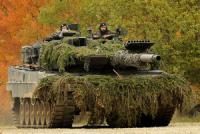
Germany has agreed to support to UN peace keeping mission in Mali, a country facing Islamist insurgency in the vast desert in the country’s north. But there is a problem: The Bundeswehr’s service vehicles were found to be unable to take Mali’s searing heat. Half to ground vehicles Germany shipped to Mali are no longer in operating condition, and the deployment of the sophisticated Tiger helicopter has been delayed because it cannot operate in temperatures which exceed 109 F.
-
-
WH report: The Assad regime's use of chemical weapons on 4 April 2017
The White House on Tuesday released a 4-page report, prepared by the National Security Council, which contains declassified U.S. intelligence on the 4 April chemical weapons attack in Syria. The document calls Russia’s claim that the source of the gas was a rebels’ storage facility a “false narrative,” accusing Russia of “shielding” a client state which has used weapons of mass destruction.
-
-
By insisting Assad must go, the West has prolonged the Syrian conflict
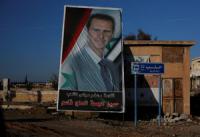
The most enthusiastic Western advocates of removing Assad form a liberal tendency and have been arguing for some form of intervention in Syria ever since the war began in earnest. They are opposed by more realist voices, who exhort them to remember the lessons of Iraq before getting militarily involved. Those on this side point to Syria’s fractured and often radical opposition, the regime’s formidable and battle-hardened forces, and the risks of starting a proxy conflict between the world’s great powers. In combination, these two tendencies have landed United States and United Kingdom foreign policy in an awkward gap between ends and means: Assad must go, but the military means required to remove him are off limits. It feels good to demand that a brutal dictator should no longer be allowed to rule, but insisting on it while failing to back it up with action has helped to prolong unimaginable suffering. Assad is clearly despicable, but the only atrocities worse than those his government has already committed are those yet to come. There are two ways to avert them: either Assad is deposed, probably via U.S.-led military intervention, or some political accord is struck to allow him to stay in exchange for a permanent ceasefire.
-
-
Medical evidence confirms sarin gas was used in Syria chemical attack
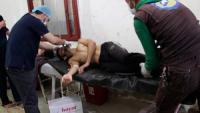
Turkey’s health minister said that traces of sarin gas have been detected in blood and urine samples from victims injured in the town of Khan Sheikhun in Syria on 4 April, offering “concrete evidence” of its use in the attack. Isopropyl methylphosphonic acid, a chemical which sarin degrades into, was found in the blood and urine samples taken from the patients who arrived in Turkey. Many of the victims of last week’s attack were taken to Turkey for treatment because the Assad regime and Russia, as part of their war strategy, have destroyed many of the medical facilities in the Sunni areas of Syria.
-
-
Enzymes versus nerve agents: Designing antidotes for chemical weapons

Nerve agents, a class of synthetic phosphorous-containing compounds, are among the most toxic substances known. Brief exposure to the most potent variants can lead to death within minutes. Once nerve agents enter the body, they irreversibly inhibit a vitally important enzyme called acetylcholinesterase. Its normal job within the nervous system is to help brain and muscle communicate. When a nerve agent shuts down this enzyme, classes of neurons throughout the central and peripheral nervous systems quickly get overstimulated, leading to profuse sweating, convulsions and an excruciating death by asphyxiation. There is a path to mitigate the danger of chemical weapons. This route lies within the domains of science – the very same science that produced chemical weapons in the first place. Researchers in the United States and around the world are developing the tools needed to quickly and safely destroy nerve agents – both in storage facilities and in the human body. There are promising advances, but no enzyme yet exists which is efficient enough for lifesaving use in people. It is worth keeping in mind the awesome and often complex power of science, however: We may be only a few years away from developing the kind of therapeutics that would make chemical weapons a worry of the past.
-
-
Hack-resistant hardware

Military and civilian technological systems, from fighter aircraft to networked household appliances, are becoming ever more dependent upon software systems inherently vulnerable to electronic intruders. DARPA has advanced a number of technologies to make software more secure. But what if hardware could be recruited to do a bigger share of that work? That’s the question DARPA’s new System Security Integrated Through Hardware and Firmware (SSITH) program aims to answer.
-
-
The Assad regime’s chemical-weapons kill chain
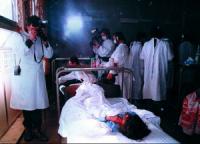
“There’s a long list of Syrian officials with blood on their hands — but the culpability goes all the way to the top,” Gregory Koblentz writes in one of the more important analyses of the Assad regime’s strategic use of chemical weapons (“Syria’s Chemical Weapons Kill Chain,” Foreign Policy, 7 April 2017). Koblentz, the author of Living Weapons: Biological Warfare and International Security, explains that the Syrian chain of command for chemical weapons is composed of four tiers: the senior leadership, which authorizes the use of these weapons and provides strategic guidance; the chemists, who produce, transport, and prepare the chemical weapons for use; the coordinators, who provide intelligence on targets and integrate chemical weapons with conventional military operations; and the triggermen, who deliver the weapons to their targets. “Together, these individuals and organizations form a chemical-weapons kill chain,” Koblentz writes.
-
-
U.S. strikes Syrian airbase from which Assad forces launched sarin gas attack
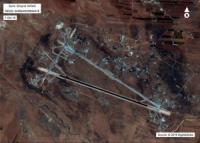
The United States has launched fifty-nine Tomahawk cruise missiles on a Syrian airfield from which Syrian military planes three days ago flew to carry out a sarin gas attack against Sunni civilians in the rebel-held Idlib province. More than eighty people, including thirteen children, were killed in the attack – and in a subsequent attack by the Syrian Air Force which destroyed the hospital to which many of the victims of the gas attack were taken. The cruise missiles were launched from the guided-missile destroyers USS Ross and Porter in the eastern Mediterranean. The United States has had military advisers and specialist on the ground in Syria for a while – it now has about 1,000 soldiers in Syria — advising the anti-regime rebels – especially the Syrian Kurds – but last night cruise missile attack marks the first time the United States has been involved as a combatant in the Syrian conflict.
-
-
Will the U.S. missile strike be the turning point in Syria’s shifting war?
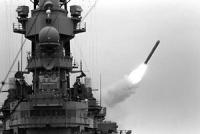
The United States has struck the Syrian airbase used to launch a suspected sarin gas attack against Khan Sheikhun that killed more than eighty civilians. The rebel commander whose district was hit by the suspected chemical weapon attack has said he hopes the strike will be a “turning point” in the war — but the long-running conflict has had many such apparently pivotal moments. A shift of U.S. foreign policy on Syria could have been the game-changer. But the U.S. airstrike is more likely to reinforce the balance of power between the combating factions rather than lead to a turning point.
-
-
At least 58 killed in Syrian army’s chemical attack in rebel-held Idlib province
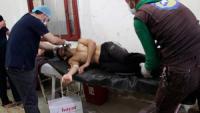
At least fifty-eight people were killed in a chemical attack the Syrian military launched by against a rebel-held Syrian town in Idlib province Tuesday morning. Medics rushed scores of injured civilians to a hospital – but the Syrian air force then bombed the hospital, reducing it to rubble. This is the third reported chemical attack in Syria in just over a week. The previous two were reported in Hama province, in an area not far from Khan Sheikhoun, the site of Tuesday’s attack.
-
-
Monitoring critical minerals to ensure national preparedness
In 2014, the Defense Logistics Agency (DLA) came to a startling conclusion: The United States needed to increase its stockpile of a basic manufacturing material with military applications — yttrium oxide, a material used in laser rangefinders. This shortfall meant that in 2014, the DLA had to submit a request to Congress to acquire new material for the National Defense Stockpile. The DLA has a watch list of about 160 materials, and economists at the agency have developed an early warning system that let them concentrate on high-priority materials.
-
-
The tragedy of Mosul: battle against Islamic State is leading to all-too-familiar consequences

A tragedy is unfolding in Mosul, the northern Iraqi city that Islamic State (IS) has brutally occupied since June 2014. The spike in civilian deaths – the result of an intensification of bombing by the international coalition during February and March — has been so dramatic, it has prompted speculation that the U.S. military has changed its rules of engagement. It has also sparked debate about whether deaths caused by the West are held to a different standard than those caused by countries like Russia. The impacts of Mosul’s brutal occupation and painful liberation are compounding Iraq’s seemingly endless list of social and economic problems. The tragedy of Mosul is that while IS’s territorial project in Iraq is coming to an end, it is creating new problems – destruction, displacement, trauma – that exacerbate the country’s existing challenges. The West must acknowledge its role in stoking this crisis, just as Russia and Iran have been responsible for suffering in Syria. Mosul, it seems, is the West’s Aleppo.
-
-
Israeli, U.S. officials unveil David’s Sling air defense system
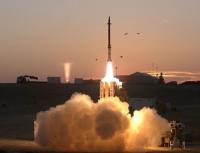
Senior officials from Israel’s political and military establishments attended Sunday’s ceremony to mark the operational integration of Israel’s newest air defense system. David’s Sling is part of Israel’s multi-tiered missile defense system. The lowest layer is Iron Dome, capable of intercepting short-range rockets and mortar shells like those fired by Hamas from Gaza. The highest layer is the Arrow 2 and Arrow 3 systems, which are intended to engage long-range ballistic missiles. The Arrow was first put in use on 17 March 2017, when it downed an incoming Syrian anti-aircraft missile.
-
-
China completes military construction on three disputed islands
China has completed major construction of military and dual-use infrastructure on three of the disputed Spratly Islands in the South China Sea. The “Big 3” — Subi, Mischief, and Fiery Cross Reefs – now have naval, air, radar, and defensive facilities, allowing Beijing to deploy military assets, including combat aircraft and mobile missile launchers, to the Spratly Islands at any time.
-
-
Hamas develops powerful new rockets, threatening Israeli towns near Gaza
The Palestinian terrorist group Hamas has acquired new, more powerful rockets that could severely threaten Israeli towns near the Gaza Strip. The rockets carry hundreds of kilograms of explosive material and have a short range of a few kilometers, similar to the range of mortar shells, according to an assessment by the Israeli military. While the Iron Dome anti-missile system can shoot down short-range projectiles, it is not as effective against mortar shells and rockets with more limited ranges.
-
More headlines
The long view
Factories First: Winning the Drone War Before It Starts
Wars are won by factories before they are won on the battlefield,Martin C. Feldmann writes, noting that the United States lacks the manufacturing depth for the coming drone age. Rectifying this situation “will take far more than procurement tweaks,” Feldmann writes. “It demands a national-level, wartime-scale industrial mobilization.”
